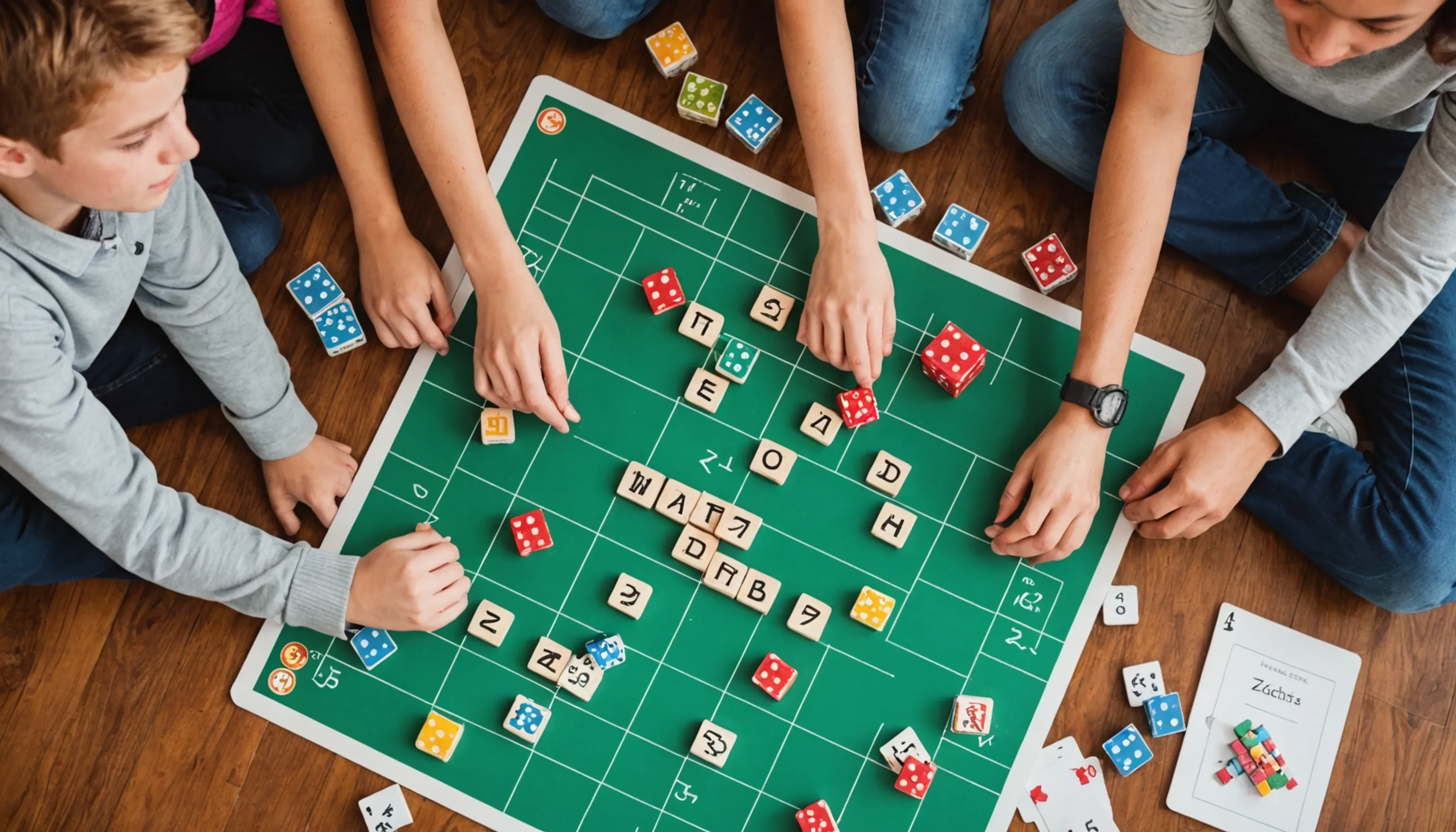Geeky Math Games for Teens
 HvWHenry van Wagenberg
HvWHenry van Wagenberg
Fun Geeky Math Games for Teens
Math doesn't have to be boring, especially for teens! Engaging them with fun geeky math games can transform their learning experience. These games often incorporate elements of strategy and creativity, making math feel more like play than work.
Some popular options include:
- Math Jeopardy: A quiz-style game that challenges players on various math topics.
- Math Puzzles: Sudoku or logic puzzles that require critical thinking.
- Escape Room Challenges: Math-themed escape rooms that require problem-solving to 'escape'.
These interactive methods can significantly boost interest and confidence in math!
Board Games That Make Math Fun
Board games can be an excellent way to make math enjoyable for teens while also fostering social interaction. Many board games that make math fun incorporate mathematical concepts into their gameplay, encouraging critical thinking and strategic planning. Here are some noteworthy options:
- Prime Climb: This colorful board game uses a spiral board and prime numbers to teach math concepts. Players move their pieces based on the roll of dice and must use strategic thinking to reach the finish line.
- Math Dice: A fast-paced game where players roll dice and create mathematical equations to reach a target number. It’s great for practicing addition, subtraction, multiplication, and division.
- Sum Swamp: Designed for younger teens, this game helps players practice their addition and subtraction skills while navigating a swamp filled with math challenges.
- Blokus: While not exclusively a math game, Blokus encourages spatial reasoning and strategic planning, essential skills in mathematics.
These games not only enhance mathematical skills but also promote teamwork and friendly competition. Playing board games as a family or in a classroom setting can create a supportive environment where teens feel more comfortable tackling challenging math concepts. Plus, they get to enjoy quality time with friends or family while learning!
Online Math Games for Engaging Learning
Online math games are an exciting way to engage teens in learning while allowing them to explore mathematical concepts at their own pace. With the rise of technology, many platforms offer online math games for engaging learning, turning traditional math exercises into enjoyable challenges.
Some popular online math games include:
- Kahoot: This interactive quiz platform allows teachers and parents to create fun math quizzes. Players can compete against each other in real-time, making learning competitive and exciting.
- Prodigy Math: A role-playing game where students solve math problems to advance in their quests. This game adapts to the player's skill level, ensuring they are challenged appropriately.
- Coolmath Games: A website filled with brain-teasing games that focus on logical thinking and strategy, often incorporating math skills without feeling like traditional math exercises.
- Math Playground: This site offers a variety of math games, puzzles, and logic challenges that cater to different age groups and skill levels.
These online platforms not only make learning math more engaging but also allow students to connect with their peers through multiplayer options. By integrating technology into education, teens can develop a stronger understanding of math concepts while having fun. This approach fosters a love for learning that can carry over into their academic pursuits.

Math Apps That Gamify Learning
In today’s digital age, math apps are revolutionizing the way teens learn mathematics by gamifying the experience. These math apps that gamify learning make studying math more accessible and enjoyable while helping students develop essential skills. Here are some noteworthy apps that combine fun and education:
- DragonBox: This app offers a series of games designed to teach algebra and geometry concepts in an engaging way. Players solve puzzles to progress through various levels, making complex ideas easier to grasp.
- Mathway: While primarily a problem solver, Mathway gamifies the learning process by providing step-by-step solutions. Students can practice solving problems and receive instant feedback, turning practice into a game.
- Todo Math: Designed for younger teens, this app offers interactive games that cover a wide range of math topics. It features adaptive learning, ensuring that students face challenges suited to their skill levels.
- Prodigy Math Game: This app combines math practice with an engaging fantasy world where players solve math problems to progress in their quests. It adapts to each player’s learning pace and style, making it highly effective.
These apps not only make learning math fun but also encourage consistent practice. By incorporating gamification, they help students build confidence in their math abilities and develop a positive attitude toward learning. As teens engage with these apps, they can enhance their skills and enjoy the journey of mathematical discovery.
DIY Math Games to Play at Home
Creating DIY math games to play at home can be a fantastic way to make learning fun and interactive for teens. These games require minimal materials and can be easily tailored to different math concepts. Here are a few ideas:
- Math Bingo: Create bingo cards with math problems. Call out answers, and players mark the corresponding problems.
- Homemade Card Games: Use a deck of cards to play games that involve addition or multiplication, like War, where players add card values to win.
- Math Pictionary: Players draw math-related terms or concepts for others to guess.
These DIY games can reinforce math skills while providing quality family time!
Creating Math Bingo
Creating Math Bingo is a fun, engaging way to help teens practice their math skills while enjoying a game with family or friends. This DIY game can be tailored to any math concept, making it versatile for different learning needs. Here’s how to set it up:
- Materials Needed: You will need bingo cards (which you can create on paper or print from online templates), markers or chips for covering the squares, and a list of math problems or answers.
- Design Your Cards: Decide on the math topic, such as addition, subtraction, multiplication, or even algebra. Fill the bingo cards with answers or solutions to the math problems you will call out.
- Calling Out Problems: Instead of calling out numbers, call out math problems. For example, if a player’s card has the answer “12,” you could call out “6 + 6” or “3 x 4.”
- Winning the Game: Players cover squares on their cards when they solve the problems correctly. The first to complete a row, column, or diagonal shouts “Bingo!” and wins a small prize.
Math Bingo not only reinforces math skills but also promotes critical thinking and quick problem-solving. It can be played in various settings, from classrooms to family game nights, and can be adapted for all ages. This makes it a great tool for parents and teachers alike!

Math Scavenger Hunt Ideas
A Math Scavenger Hunt is an engaging way to combine physical activity with math practice, making it a great option for teens who learn best through movement and exploration. Here are some creative ideas to set up a fun and educational math scavenger hunt:
- Location-Based Problems: Choose a location, such as a park or schoolyard, and create math problems related to specific landmarks. For example, ask participants to measure the length of a bench, then calculate its perimeter.
- Math Riddles: Create riddles that lead to different locations, where each clue contains a math problem to solve. For instance, “To find your next clue, solve 8 x 7; the answer will show you where to head next!”
- Collecting Items: Have teens gather items that represent certain numbers or shapes. For example, they could find three round stones (to represent circles) or five leaves (to represent the number five).
- Time Challenges: Set a timer and give teams a series of math-related tasks to complete within that time. The tasks could involve solving equations, finding specific shapes, or measuring distances.
These scavenger hunt ideas not only encourage teamwork and problem-solving skills but also make learning math enjoyable and interactive. Tailor the difficulty of the math problems to suit the age and skill level of the participants, ensuring everyone has fun while reinforcing their math knowledge!
Card Games to Improve Math Skills
Card games are not only a source of entertainment but also a fantastic way to improve math skills in a fun and engaging way. Here are several card games to improve math skills that can be enjoyed by teens and their families:
- Math War: This classic game is played with a standard deck of cards. Each player flips two cards and must add, subtract, or multiply their values to determine the winner of that round. The player with the highest total wins the cards. This game can be adapted to practice different operations, helping teens sharpen their math skills.
- 21 (Blackjack): A popular casino game that teaches addition and strategic thinking. Players aim to get as close to 21 as possible without going over. This game encourages quick mental calculations and helps teens understand probability and risk management.
- Card Sort: Create a deck with cards that have various math problems on one side and answers on the other. Players take turns drawing a card, solving the problem, and then sorting it into the correct answer pile. This game promotes quick thinking and reinforces math concepts.
- Equation Building: Use a deck of cards to create equations. Players draw cards to form an equation and then challenge others to solve it. This game enhances problem-solving skills and encourages collaboration.
These card games can easily be adapted for different skill levels and can be played anywhere. They are a great way to make math practice enjoyable while developing essential skills!
Math Challenges and Competitions
Math challenges and competitions are excellent ways to motivate teens to enhance their mathematical skills while having fun. These events can take various forms, from school contests to online challenges. Participating in math competitions helps students develop critical thinking, problem-solving skills, and teamwork.
Some popular competitions include:
- Math Olympiads: National or international contests that challenge students with advanced problems.
- Math League: A series of competitions held in schools focusing on different math topics.
- Online Math Challenges: Platforms like Art of Problem Solving host virtual competitions accessible to all.
These activities can boost confidence and foster a love for math!
Participating in Math Olympiads
Participating in Math Olympiads is an exciting opportunity for teens to showcase their mathematical talent and challenge themselves against some of the brightest minds. These competitions not only enhance students' problem-solving skills but also foster a deep appreciation for mathematics.
Math Olympiads are typically structured as multi-level competitions, starting from local or school-level contests and advancing to regional and national levels. Participants face challenging problems that require creative thinking and advanced mathematical concepts, often beyond the standard curriculum. Here are some benefits of getting involved:
- Skill Development: Participants improve their analytical and critical thinking skills through rigorous practice and preparation.
- Collaboration: Many students form study groups to prepare together, promoting teamwork and communication skills.
- Networking: Olympiads provide opportunities to connect with like-minded peers and mentors, which can be invaluable for future academic pursuits.
- Scholarship Opportunities: Excelling in Math Olympiads can lead to scholarships and recognition from prestigious educational institutions.
To prepare for Math Olympiads, students can engage in practice problems, join math clubs, and participate in workshops or online courses focused on competitive mathematics. The experience gained from these competitions can significantly boost a student's confidence and passion for math, opening doors to various academic and career paths.
Hosting a Math Trivia Night
Hosting a Math Trivia Night is a fantastic way to combine fun, learning, and friendly competition among teens. This engaging event can help reinforce math skills while providing an enjoyable social atmosphere. Here’s how to plan an exciting Math Trivia Night:
- Set a Date and Venue: Choose a date and location that works for everyone, whether it’s at home, in a community center, or even online via video conferencing.
- Prepare the Questions: Create a mix of trivia questions covering various math topics. Include different formats such as multiple-choice, true/false, and open-ended questions. Consider categories like geometry, algebra, history of math, and fun math facts.
- Form Teams: Divide participants into teams to encourage collaboration and teamwork. This allows everyone to contribute their unique strengths and knowledge.
- Set the Rules: Establish clear rules for the game, including how scoring will work, time limits for answering questions, and any penalties for incorrect answers.
- Prizes: Consider offering small prizes for the winning team to motivate participants and add excitement to the event.
Math Trivia Night not only strengthens math skills but also fosters a sense of community and encourages healthy competition. Participants can learn from each other while enjoying a fun night filled with laughter and camaraderie. This engaging format can turn math into an enjoyable experience that teens will look forward to!
